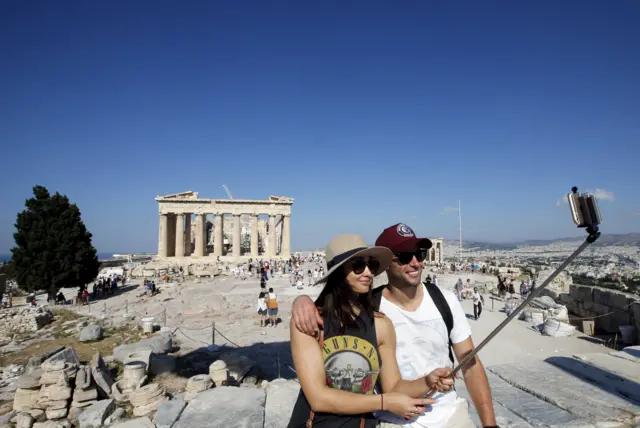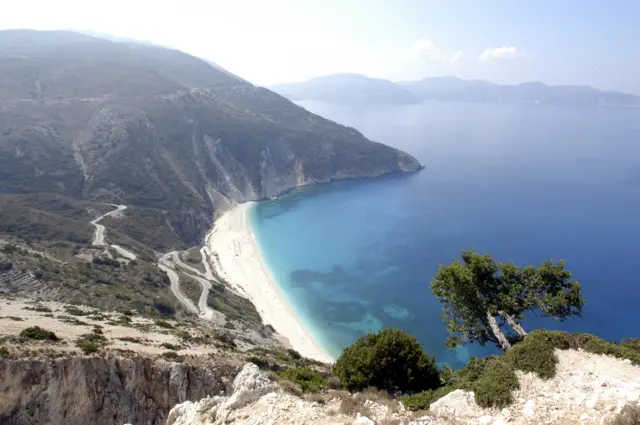'Signs from EU grim for Tsipras'published at 07:07 BST 7 July 2015
Newsnight chief correspondent Laura Kuenssberg tweets:
No increase in emergency funding for the Greek banking system, says the European Central Bank
Greek banks to stay closed on both Tuesday and Wednesday this week
Greece to propose 30% debt haircut in eurozone talks on Tuesday
Euclid Tsakalotos will be the new Greek finance minister, taking over from Yanis Varoufakis
Greek voters decisively reject terms of international bailout in referendum
Ian Pollock
Newsnight chief correspondent Laura Kuenssberg tweets:
David Charter, Berlin correspondent of The Times, tweets:
The World Economic Forum tweets...
 Image source, Reuters
Image source, ReutersThis is the latest advice from Thomas Cook for customers visiting Greece. You can find out moreon the Thomas Cook website, external.
Quote MessageThe feedback from the team on the ground - and indeed returning holidaymakers – has been that it is business as usual in the resorts, with customers continuing to enjoy their holidays without disruption. A Greek exit from the Eurozone would have little impact on the holidays customers have already booked with us as all pre-paid services are provided by Thomas Cook. We have existing contracts with hotels and airlines and we are comfortable that there is enough cash within destination to continue to provide the quality holidays our guests have booked and expect from us. Thomas Cook guests travelling to Greece should continue to take Euros to cover the duration of their holiday. This should be in small denomination notes i.e. €5, €10, and €20's.
Kostas Bokos has shut his business in Athens and is moving back to London. This is what he told the BBC:
Quote Message"I am a Greek Brit and have a business in Greece which has been hard hit by the crisis and many of its implications. Things here - businesses, the economy - have ground to a halt. Whoever has some access abroad is looking for a way out. The results have confirmed that my decision to close my business a week before the referendum was called was the right one. It has also finalised my decision about my family's future being back in Britain. I'm out of here on 4 August.
Ian Bremmer is president of the Eurasia Group, which studies political risk. He is also professor of political science at New York University. He tweets:

Live page reader Russell Parrott lives on the island of Kefalonia. He had this useful advice for tourists visiting his island.
Quote MessageIn Pylaros (center of island round Agia Efimia) the only real shortage we have (at present) is tourists - all Tavernas are open, welcoming and serving great local food, at least one supermarket shop taking credit cards (well OK only supermarket shop that does) at the moment is is pretty much business as usual. I cannot comment for the 'South' - Skala way, but certainly in this area so far things are OK. Many yachts still around and the flotillas seem to be OK. People still eating out enjoying good weather, really friendly people who live in a true community. May not be the same on other islands, but certainly Kefalonia so far is fine - even ordered medicines yesterday to collect today at the pharmacy.
Russell Parrott, Resident Kefalonia, Greece
Live page reader Emily Robinson asks:
 Image source, Reuters
Image source, ReutersQuote MessageI just wondered if the BBC could shed any light on what this means for tourists? We are off to Kefalonia on Saturday and we are very anxious. There are whispers that the hotels can’t feed their guests as they can’t pay suppliers and everyone is advising taking more money due to the bank situation. What does the ‘no’ vote and the volatile state of the economy in Greece mean for tourists travelling out their this week?
BBC personal finance reporter Kevin Peachey can answer some of those questions asked by Emily. You can read his piece here.
Duncan Weldon, BBC Newsnight's economics editor has more useful analysis. He tweets:
Tim Franks the presenter of BBC's Newshour tweets:
The giant fund management group, Investec has this comment on the result of the Greek referendum.
Quote MessageAhead of the referendum, many in the Euro area warned that a ‘no’ was tantamount to a vote to leave the euro. This risk has now increased sharply, yet the international authorities will still try to strike a deal, perhaps offering modest compromises... Overall Greek PM Tsipras has bought himself a short amount of time to gain some concessions, but it is not clear what on the table will be any different from the discussions 10 days ago, with debt relief remaining a major area of disagreement.
Tim Franks the presenter of BBC's Newshour tweets:
BBC chief correspondent Gavin Hewitt tweets:
BBC Money Box presenter Paul Lewis tweets:
Duncan Weldon the economics correspondent for Newsnight tweets:
BBC economics editor, Robert Peston tweets:
See below for a very good summary of where we stand this morning from Duncan Weldon the economics correspondent of Newsnight. His second tweet mentions ELA which stands for emergency liquidity assistance. It is the credit line from the European Central Bank (ECB) which has been keeping Greek banks afloat.
A mixed message from Yanis Varoufakis, the Greek Finance minister this morning. He has published a blog, external with some tough words for the creditors.
Quote MessageFrom the moment our election seemed likely, last December, the powers-that-be started a bank run and planned, eventually, to shut Greece’s banks down.
Yanis Varoufakis, Greek finance minister
However he strikes a more conciliatory tone later in the blog.
Quote MessageToday’s referendum delivered a resounding call for a mutually beneficial agreement between Greece and our European partners. We shall respond to the Greek voters’ call with a positive approach.